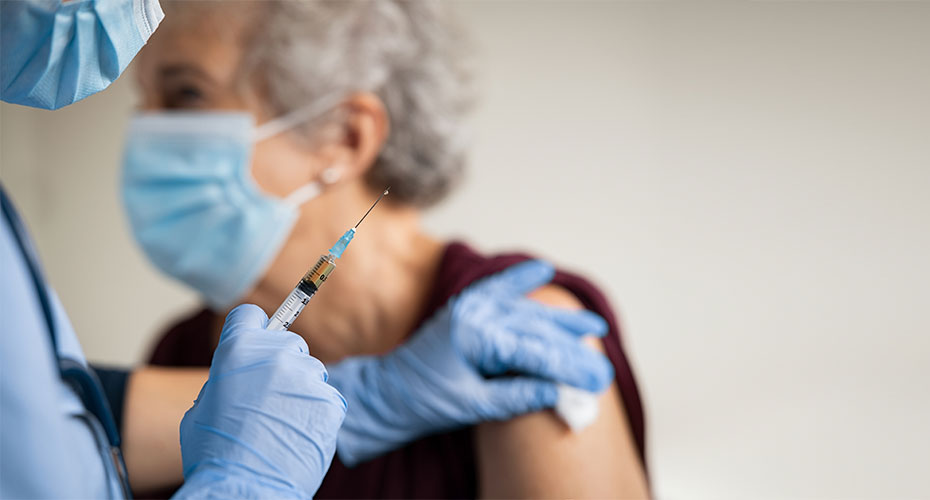Dec 16, 2020
'Light at the end of the tunnel'
For Dr. Athe Tsibris, the new COVID-19 vaccine brings a sense of much-needed hope, along with life-saving protection, as delivery trucks roll up to hospitals and long-term care facilities around the country this week.
“There is a light at the end of the tunnel, and it makes it easier for us to be hopeful for our patients," said Tsibris, an infectious disease physician who specializes in virology at Brigham and Women’s Hospital and is an assistant professor at Harvard Medical School. "This gives us a powerful tool to end the pandemic.”
The two-dose vaccine, developed by Pfizer and its German partner, BioNTech, was authorized for emergency use by the Food and Drug Administration and the U.S. Centers for Disease Control and Prevention. Massachusetts is receiving approximately 59,000 doses starting Dec. 14, and expects to receive 300,000 by the end of December.
With guidance from the state, Massachusetts hospitals have been planning for the vaccine’s distribution for months, including coordinating how to ship doses to hospitals, how to store it at -80 degrees Celsius, and how to administer it, said Tsibris, who is also on the Brigham’s COVID Implementation Committee.
In line with state and CDC recommendations, health care workers who are working with COVID-19 patients will be the first to receive the vaccine at the Brigham, Tsibris said, a group that includes doctors, nurses, food service and environmental services staff. Those who do not work directly with COVID-19 patients will be next in line. Each will receive two doses, 21 days apart.
"Knowing the vaccines are coming is already raising morale at the hospital," Tsibris said.
DPH has been working to support COVID-19 vaccination planning and implementation since early August, building on the state’s experience in distributing approximately 3 million vaccine doses for the flu and other illnesses each year.
Read more about the vaccine rollout plan here

Tara Gregorio, president of the Massachusetts Senior Care Association, said long-term care administrators will be educating staff, residents, and their families on the efficacy and safety of the vaccine.
“The Massachusetts Senior Care Association together with our residents, their families and caregivers are extremely grateful to state and federal public health officials for continuing to prioritize the protection of residents and staff in nursing homes, assisted living facilities, and rest home residents, by ensuring they are in the first cohort of COVID-19 vaccine recipients,” Gregorio said in a statement. “The Baker Administration's planned rollout is great news and supports our collective hard work to further protect our vulnerable residents and their dedicated caregivers.”
The vaccine is free to recipients, with the federal government paying for the vaccine itself and health plans including Blue Cross Blue Shield of Massachusetts paying clinicians to administer the shots.
As a scientist, Tsibris is naturally cautious, but he says a combination of promising data and transparency – both from federal entities and pharmaceutical companies – put any concerns to rest.
“My main reaction is one of hope,” Tsibris says. “Reviewing that data is reassuring me that we’re getting to a point where there’s a way out of this pandemic.”
A peer-reviewed study of Pfizer's data, and an independent review by scientists at the FDA, have found the vaccine is 95% effective.
“Reviewing that data is reassuring me that, yes, it's a new vaccine, yes, it's new technology for a vaccine, yes, the process has been faster, but I'm comfortable with it and am recommending it to patients and ready to receive it,” Tsibris says. “The process is much faster than is typical, but time is a luxury we don't have.”
Vaccine news has been met with some hesitation by members of the public, which Tsibris notes is a result of a painful history of earned mistrust of the medical community – particularly for communities of color.
"This provides an opportunity to earn some of that trust back with honesty and open dialogue," he said.
Nearly 3 million doses of the vaccine are scheduled to be delivered to 145 facilities around the country Dec. 14, as the U.S. marked the deaths of more than 300,000 Americans. Later in the week, the vaccine will be delivered to nearly 500 other sites, the beginning of the biggest public health effort in generations.
"It will take months," Tsibris said, "and in the meantime, we need to continue to follow basic precautions, like wearing masks and physical distancing."
Did you find this article informative?
All Coverage content can be reprinted for free.
Read more here.

